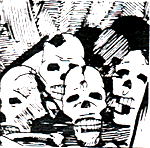"To us all towns are one, all men our kin. |
"To us all towns are one, all men our kin. |
| Home | Trans State Nation | Tamil Eelam | Beyond Tamil Nation | Comments |
Sri Lanka's Genocidal War - '95 to '01
Chemmani Mass Graves -
US based Ilankai Thamil Sangam calls for US action to end war crimes

 The US based Ilankai Thamil Sangam in a call for action by the US, declared on 15 October 1998:
The US based Ilankai Thamil Sangam in a call for action by the US, declared on 15 October 1998:
"The U.S. Department of States Sri Lanka Country Report on Human Rights Practices for 1997 states in Section 1. paragraph 3 that,
'Since April 1995 at least 700 persons have been extrajudicially killed by the security forces or disappeared after being taken into security forces custody and are presumed dead. As of years end, no member of the security forces had been convicted for any of these crimes. In the vast majority of cases where military personnel may have committed human rights violations, the Government has not identified those responsible and brought them to justice.'
Amnesty International, on November 27, 1997, speaking about the missing stated that, "nearly all of them are likely to have died under torture or been deliberately killed in Sri Lankan military custody."
The former soldier, first accused, Somaratne Rajapakse convicted on July 3, 1998 for the rape and murder of Krishanthi Kumaraswamy, and the murder of her mother, brother, and neighbor said in open court that, "There are 300 to 400 bodies in this land, almost every evening, dead bodies were brought there and the soldiers were asked to bury them. The third and seventh accused who were also convicted confirmed the first accuseds statement. The AFP news service, on August 23, 1998, reported that prison guards assaulted Rajapakse resulting in him being hospitalized.
Though the allegations were made in court on July 3, 1998, Mr. Rajapakse has not yet been taken to Chemmani to identify the location of the graves nor has any excavation been undertaken. Neither the Human Rights Commission nor the Government have responded positively to the offers of assistance made by several governments and the UN. The retired Supreme Court Judge who heads the Commission has been very slow to react to these accusations of delays.
The Sinhala weekly "Yukthiya" published a map, during the second week of July 1998, that showed the location of the graves. It also reported that after Operation Riveresa senior commanding officers in Jaffna gave orders for the killing and sending of bodies to the Chemmani checkpoint for burial. The weekly said that the security forces also sent live prisoners to Chemmani to be killed and buried.
The paper mentioned that Jaffna was under the command of Brigadier Sri Lal Weerasuriya under whom Brigadiers Karunatilake and Janaka Perera were handling security in assigned areas. It added that Brigadier Janaka Perera was in command of Chemmani at the time of the mass murders and burials.
It is important for the United States and the United Kingdom to find out whether any of the above named officers, or any other officers who served in Jaffna during or at the end of the Riveresa Operations, received any training from the U.S. or British military academies.
The Sunday Times of August 16, 1998 reports that,
"The Joint Operations Command, based in Colombo, is to soon take over the task of directing and controlling all counter terrorism activity including operations. Until it becomes fully operational, the existing Vavuniya based Joint Operations Headquarters (JOH) will continue. The JOH is under the operational control of Major General Sri Lal Weerasuriya, Overall Operations Commander (OOC). He is also Chief of Staff of the Army."
It is alleged that Brigadier Janaka Perera received training in the United States before the Riveresa Operations and had also gone for training in England returning to Sri Lanka before or during the current Jaya Sikuru operations. He is also now a Major General.
The Washington Post, on Sunday July 12, 1998, in the article "Free of Oversight, U.S. Military Trains Foreign Troops" stated that,
"In Sri Lanka, U.S. Military training is described in a fiscal 1999 report to Congress by the State Department as an effort to train key military leaders in human rights principles and procedures. In fact in f.i.d. (foreign internal defense) exercises the Green Berets and SEALS have trained the Sri Lankan army in long-range patrolling, tactical reconnaissance, rapid reaction air and sea attacks and maritime operations that are aimed at depriving Tamil rebels of easy access to supply bases in Tamil Nadu across the Palk Strait in India, according to Defense documents and interviews. At least 500 Sri Lankans and 115 U.S. Troops were involved in the 1996 and 1997 exercises. More have taken place this year."
The Report of the United Nations Special Rapporteur on Disappearances and Extrajudicial Killings, Mr. Barcre Waly Ndiaya, on his visit to Sri Lanka, submitted pursuant to Commission on Human Rights resolution 1997/61, comments extensively on the effect of the Emergency Regulation Act (ERA) and the Prevention of Terrorism Act (PTA) in Sri Lanka and how they affect extrajudicial and summary executions and hamper prosecution of the police and armed forces who commit these crimes. The relevant paragraphs in the report are 72 and 89. Paragraphs 108 and 109 show how the State and the Minister of Justice can hamper any investigation.
The report added that,
"There is every likelihood that the current delays of the investigation may be due to the ERA and PTA laws and the powers of the Minister to hamper the investigation. The delays of the investigation by the Human Rights Commission (HRC) may be due to the interference by the State and the Deputy Minister of Defense who is directing the military operations in the North and East. The investigation has taken a back seat to the military offensive in order not to demoralize the forces and not complicate matters by investigating the commanding officers of the current operations."
The Government now states that the Jaffna Magistrate court is the competent authority to conduct the investigation. The Government is aware that the courts in Jaffna are not functioning due to the lack of a functioning civilian administration. The government is now playing politics with the mass graves of those killed by its armed forces. It could, like in the Krishanthi rape and murder trial, hold a trial at bar.
The government has also ordered the coordinator and his associate Messers Senaka Dissanayake and Lohan Chandrasekere of the Human Rights Commission based in Jaffna to cease their activity immediately and return to Colombo. They were collecting information on the 700 disappearance and the mass graves. The NGO groups in Jaffna appealed to the Government to cancel the transfer order, but to no avail.
Considering the proposed bill sponsored by Senator Patrick Leahy (D-VT) prohibiting U.S. aid to any unit of a foreign security force that has been implicated in gross human rights violations;
Recognizing the statement by spokesperson James Rubin, in the Washington Post of Sunday July 12, 1998, indicating the intention of "Secretary of State Madeline K. Albright to require U.S. Ambassadors to use their authority over scheduling of U.S. military activities to ensure foreign troops with whom the U.S. military plans to train are vetted for human rights abuses;"
Giving credence to the claim by Mr. Rubin that, "Secretary Albright is determined to do all we can at the embassy level to make sure that such assistance does not take place;"
Accepting the documentation of the human rights abuses by the armed forces of Sri Lanka, as reported by
- 1) the UN Rapporteur,
- 2) the 1997 Human Rights Report of the U.S. State Department,
- 3) the U.S. Committee for Refugees and
- 4) Amnesty International;
It is paramount that the United States stop all training and other assistance to the armed forces of Sri Lanka and not knowingly associate with those who are committing war crimes against the Tamil community in Sri Lanka.
The Tamil community urges the United States to ensure that:
- The site of the mass graves in Chemmani be identified without any further delay under the direction of international specialists.
- The identified site be protected as per the UN Model Protocol for the disinterment and analysis of skeletal remains.
- Before the informant and the remains from the site disappear the international community intervenes and brings justice to those whose remains are in the mass graves and to those who have disappeared while in the custody of the armed forces of Sri Lanka.